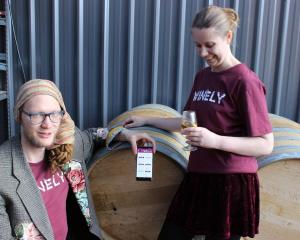That was the interesting thing about bowel obstructions - "you know there's something there; you need to do the surgery to see what you're going to find" - and he had extricated everything from stones and corn cobs to socks and knickers.
Mr Brown established his veterinary practice in Dunedin in 1985, relocating to the former Georgie Pie restaurant site in Bank St in 2001.
Gardens Vet and Pet Planet comprises both a veterinary clinic and a pet store, along with an on-site grooming facility.
There are about 16 full-time and part-time staff as well as three very popular pets on site - Charlie, the Jack Russell dog, Midi, the cat and Gary, the female lorikeet.
There had been many changes in the veterinary profession since Mr Brown began his career in 1971.
Originally from Invercargill, where he was a "townie", his father was involved with farming activities, which always intrigued him.
After graduating from Massey University with a veterinary science degree, he worked in rural practices in Southland, both in Riversdale and Te Anau, before working for a vaccine company in Melbourne.
He headed back to Dunedin, where he had earlier attended King's High School and the University of Otago, and worked for the Ministry of Agriculture for five years before setting up his own practice.
Pets today were "part of the family", business manager Fiona Crutchley said, while Mr Brown said the overall welfare of the animal was important to owners.
They did a lot more dental checks and work and also more routine geriatric checks on older pets. One of the biggest changes was the type of pet food available, including specialty foods for the likes of joint, skin and gut conditions.
There were new diagnostic techniques and the ability to refer to veterinary specialists such as those in the fields of ophthalmology, dermatology and orthopaedics.
In the early days of being in rural practice, there was much manual work, including a lot of manual restraint of cattle and horses, but that had changed.
But one thing that had not changed was that "animals are still animals", Mr Brown said.
Gardens Vet was a three-vet general practice and Mr Brown tended to do large animal work, and had a special interest in deer. He had clients as far afield as Palmerston and Southland.
He was involved with setting up a venison-processing operation based at Invermay in 1993 and is a director of Otago Venison.
The company, which employs about 25 staff, has processed as many as 40,000 animals a year, although this year it was probably going to be about 20,000.
It was during his early years in rural practice that the deer industry got under way, and there was a lot of live capture.
It had been interesting to be involved with and he had maintained that interest in deer.
While the vet clinic was based in the city, staff treated "all sorts of things" - from sheep turning up for Caesarean operations to surgery on a miniature horse.
"We'll take on anything that needs to be done," he said.
Last year, they had two cases of dogs hit by trains, which was "most unusual".
The business had evolved over the years and a big change was moving into the current premises and incorporating the retail and pet shop side.
Mrs Crutchley, who has a background in farming and retail, joined the team six months ago, having managed a cleaning supplies company in Dunedin for the previous five years. One of her main roles was to provide direction for the business.
It was an exciting time for the business and she was looking forward to helping take it "to the next level".
Mr Brown said the veterinary profession was a good one to be involved with and he was all for having students at the clinic for work experience.
The profession was also quite diverse, there being many different directions graduates could take, he said.














